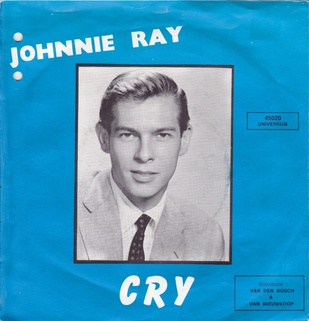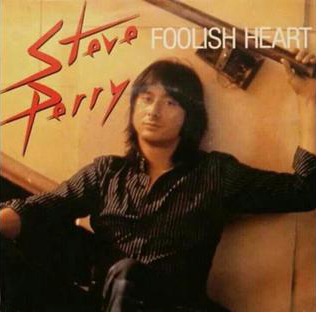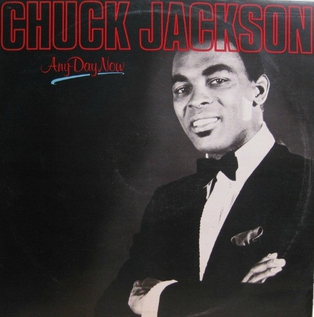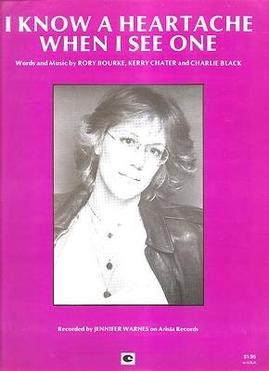"I Really Don't Want to Know" is a popular song written by Don Robertson (music) Howard Barnes (lyrics). The song was published in 1953.
"If (They Made Me a King)" is a popular song with music written by Tolchard Evans and the lyrics written by Robert Hargreaves and Stanley J. Damerell. The song was written in 1934, but the most popular versions were recorded in 1950–1951. Perry Como's version, recorded November 28, 1950, was a number-one hit on the Billboard charts for eight weeks. The Como version was released under the following labels and catalog numbers:
Frank Mills is a Canadian pianist and recording artist, best known for his solo instrumental hit "Music Box Dancer".

"Cry" is a 1951 popular song written by Churchill Kohlman. The song was first recorded by Ruth Casey on the Cadillac label. The biggest hit version was recorded in New York City by Johnnie Ray and The Four Lads on October 16, 1951. Singer Ronnie Dove also had a big hit with the song in 1966.

"I'll Be Your Everything" is a song by American pop music singer Tommy Page from his album Paintings in My Mind. Released as a single in early 1990, "I'll Be Your Everything" reached No. 1 on the US Billboard Hot 100 chart in April 1990. The song spent one week at No. 1, thirteen weeks in the top 40 and was certified gold by the RIAA. "I'll Be Your Everything" also peaked at No. 31 on the Billboard Adult Contemporary chart.

"Breaking Up Is Hard to Do" is a song recorded by Neil Sedaka, co-written by Sedaka and Howard Greenfield. Sedaka recorded this song twice, in 1962 and 1975, in two significantly different arrangements, and it is considered to be his signature song. Between 1970 and 1975, it was a top-40 hit three separate times for three separate artists: Lenny Welch, The Partridge Family and Sedaka's second version. The song was also adapted into multiple languages, most notably in Italian and French.
"Wasted on the Way" is a 1982 song by American folk rock band Crosby, Stills & Nash, featuring harmony vocals by Timothy B. Schmit. It was their first top 10 hit in five years, and peaked at #9 on the Billboard Hot 100 singles charts in August 1982. On the Adult Contemporary chart, "Wasted on the Way" was the group's biggest hit on the chart, peaking at number two for five weeks. It appeared on the band's 1982 album Daylight Again. The B-side was the David Crosby composition "Delta".

"Time" is a song released in 1981 as a single by the Alan Parsons Project. It was from their 1980 album The Turn of a Friendly Card. In the U.S., the song peaked at No. 15 on the Billboard Hot 100. On the U.S. Adult Contemporary chart, "Time" peaked at #10. In addition, "Time" spent two weeks at #14 on Cashbox, making it the group's second most successful single. Cashbox ranked it as the 94th biggest hit of 1981. Outside the US, the song peaked at #30 in Canada.

"Foolish Heart" is a song written by Steve Perry and Randy Goodrum, and was performed by Perry from his first solo album, Street Talk. It was released as the fourth single from the album in November 1984 and peaked at number 18 on the Billboard Hot 100 and number two on the Adult Contemporary chart in February 1985.
The discography for Canadian country-pop singer Anne Murray includes 32 studio albums, 15 compilation albums and 76 singles. Murray has sold over 55 million records across the world, becoming one of the best-selling Canadian artists in history. She has scored 10 number one hits on Hot Country Songs and 8 number one hits on Adult Contemporary Chart.

"Any Day Now" is a popular song written by Burt Bacharach and Bob Hilliard in 1962. It has been recorded by numerous artists over the years, including notable versions by Chuck Jackson in 1962, Alan Price in 1965, Elvis Presley in 1969, Scott Walker in 1973 and Ronnie Milsap in 1982. In the lyrics, the singer predicts the imminent demise of a romantic relationship and describes the sadness this will leave.

"Crying Time" is a song from 1964 written and originally recorded by the American country music artist Buck Owens. It gained greater success in the version recorded by Ray Charles, which won two Grammy Awards in 1967. Numerous other cover versions have been performed and recorded over the intervening years.

"Only Love Can Break a Heart" is a popular song from 1962, performed by the American singer-songwriter Gene Pitney. The song was written by Hal David (words) and Burt Bacharach (music) and appears on Pitney's second album Only Love Can Break a Heart.
"My Boy" is a popular song from the early 1970s. The music was composed by Jean-Pierre Bourtayre and Claude François, and the lyrics were translated from the original version "Parce que je t'aime, mon enfant" into English by Phil Coulter and Bill Martin.
"Dream On" is a song written by Dennis Lambert and Brian Potter. In 1974, The Righteous Brothers had a hit version, reaching No. 32 on the Billboard Hot 100, and No. 6 on the U.S. and Canadian Adult Contemporary charts. Bill Medley and Bobby Hatfield alternate lead vocals.

"Stormy" is a hit song by the Classics IV released on their LP Mamas and Papas/Soul Train in 1968. It entered Billboard Magazine October 26, 1968, peaking at #5 on the Billboard Hot 100 and #26 Easy Listening. The final line of the chorus has the singer pleading to the girl: "Bring back that sunny day." The single, along with the prior release of "Spooky" and, soon after, the release of "Traces", formed a trio of solid hits for the band.

"I Can't Help It (If I'm Still in Love with You)" is a song written and originally recorded by Hank Williams on MGM Records. It hit number two on the Billboard country singles chart in 1951. In his autobiography, George Jones printed the first six lines of the song and stated, "Its lyrics couldn't be more simple - or profound."

"Missing You" is a song written and recorded by singer/songwriter Dan Fogelberg in 1981 at the Bennett House studios in Franklin, Tennessee with producer and Elvis Presley bassist Norbert Putnam and drummer Joe Vitale who was known for his work providing a Latin feel to recordings with Stephen Stills Manassas Band and on CSN's song Dark Star. Previously unreleased, Missing You was included on his Greatest Hits LP and released simultaneously.

"I Live for Your Love" is a 1987 song by Natalie Cole. It was the second of four charting singles from her Everlasting LP, and was also the second greatest hit from the album.

"I Know a Heartache When I See One" is a song by Jennifer Warnes from her fifth LP, Shot Through the Heart. It was the first of three charting singles from the album.













